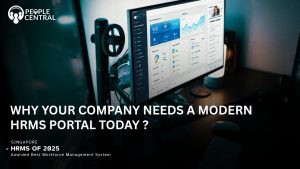Employee onboarding plays a crucial role in establishing a strong foundation for new hires. In this section, we will explore the importance of effective employee onboarding and how AI is revolutionizing this process.
By leveraging AI capabilities within HRMS, organizations can streamline onboarding, enhance employee engagement, and drive productivity. With the right technology in place, companies can provide a seamless transition for new employees while maximizing their overall potential.
Importance of Employee Onboarding
Employee onboarding is key to the success of any organization. AI has revolutionized the process, making it essential in today’s digital age. AI in HRMS onboarding provides many benefits. It secures sensitive data, automates repetitive tasks, and creates personalized experiences. To use AI effectively, comprehensive training and support systems are needed. There can be challenges, but success stories exist.
In conclusion, AI technology is critical for successful employee onboarding.
Role of AI in Employee Onboarding
AI is essential in employee onboarding. It brings many benefits, streamlining the whole experience. AI provides enhanced data security, improved accuracy and efficiency, and a smooth onboarding process. Automation of tasks and personalization of the onboarding makes it efficient and effective.
AI ensures sensitive data is secure. Robust protocols protect confidential info from unauthorized access or breaches. AI can detect anomalies or suspicious activities, enabling quick action.
AI also increases efficiency and accuracy in onboarding. Automating paperwork, verification, and compliance checks saves time and reduces human error. New employees become productive sooner.
AI integrates systems and platforms, streamlining the process. Data transfer is seamless, eliminating duplicate data entry and boosting coordination. AI-powered chatbots and virtual assistants offer 24/7 support, answering queries and guiding new employees.
AI in HRMS Onboarding: Efficiency and accuracy are key, making employee onboarding simpler.
Benefits of Using AI in HRMS Onboarding
Discover the incredible benefits of incorporating AI into HRMS onboarding. From enhanced data security to improved efficiency and accuracy, and a more streamlined onboarding process, AI revolutionizes the way organizations bring new employees on board. With cutting-edge technology at their disposal, businesses can ensure a seamless integration for their new hires while also optimizing their HR processes. Harness the power of AI in HRMS onboarding and unlock the potential of your workforce.
Enhanced Data Security
AI in HRMS onboarding safeguards employee data, encrypting and storing it securely, reducing the risk of data leakage. Advanced authentication measures, such as biometric verification and two-factor authentication, can be used to boost security.
AI algorithms are capable of detecting and monitoring any suspicious activity, as well as anomalies in data patterns. Data backups and disaster recovery plans can be automated and tested using AI technologies, so employee data stays safe and accessible.
Security protocols are continuously monitored and updated with AI systems, enabling organizations to stay ahead of potential threats and ensure optimal data protection.
Organizations leveraging AI-enhanced onboarding processes can also gain valuable insights into potential vulnerabilities in their security infrastructure. Through machine learning algorithms and analyzing past incidents, they can identify areas for improvement and proactively strengthen their data security. Training employees and optimizing AI systems continually can help organizations stay resilient against ever-evolving cybersecurity threats.
Improved Efficiency and Accuracy
Organizations can experience massive gains in accuracy and efficiency through AI-infused HRMS onboarding. AI technologies make the process simpler, cutting down manual work and increasing productivity. Automation and advanced algorithms erase human errors, guaranteeing accuracy in data entry, documentation, and compliance checks. Not only do these enhancements save time, but they also enhance the effectiveness of the onboarding process.
AI in HRMS onboarding brings multiple benefits. Here are some examples:
| Automation | Documentation | Compliance Checks | Data Entry |
|---|---|---|---|
| Reduces manual effort and ensures accurate completion | Speeds up document processing and increases accuracy | Guarantees compliance with regulations | Reduces errors and manual input |
Thanks to AI, organizations can optimize their onboarding processes, while ensuring precision and efficiency. AI also offers comprehensive analysis of employee performance during onboarding, giving insight into areas that require improvement or adjustment.
Many large companies, such as Microsoft, have successfully implemented AI-driven solutions, making their employee onboarding processes more efficient by reducing paperwork and streamlining approvals. This has not only improved accuracy, but it has also helped reduce errors associated with traditional methods of onboarding.
Streamlined Onboarding Process
Using AI in HRMS onboarding can streamline the process. It can be done in several steps: automated documentation, personalized onboarding plans, virtual assistants, real-time feedback, and integration with existing systems. Plus, comprehensive training and support for employees using AI tools.
A real example? A large multinational corporation implemented an AI-powered virtual assistant for their new employees. This streamlined the onboarding experience and reduced time for new employees to become productive members of the organization.
By adopting AI in HRMS onboarding, organizations can improve efficiency, accuracy, and the onboarding experience. This sets the stage for success and helps employees integrate seamlessly into their roles. So don’t be a robot, focus on the important stuff – like choosing a cool swivel chair.
AI in HRMS Onboarding Best Practices
Improve employee onboarding with AI in HRMS by implementing best practices. Discover the power of personalization, recruitment automation, and diagnosing/addressing issues for a seamless onboarding experience.
Personalized Onboarding Experience
The significance of offering a personalized onboarding experience for new employees is immense. By personalizing the process to each employee, organizations can develop a more inviting and inclusive atmosphere that encourages participation and facilitates the incorporation of new hires into the company culture.
| Customized Training | Individualized Mentorship | Personalized Communication |
|---|---|---|
| With AI technology, organizations can modify training materials and resources based on the particular needs and objectives of every employee. This guarantees that new hires receive the help and knowledge they require to thrive in their positions. | AI-driven platforms can pair new employees with mentors who have similar backgrounds or interests. This allows them to get guidance and assistance from someone who comprehends their special difficulties and can provide valuable insight. | AI tools can examine employee preferences and communication styles to adjust messages, notifications, and updates accordingly. This helps to build a more personalized experience, ensuring that new hires feel noticed, respected, and connected from the first day. |
Moreover, by taking advantage of AI in HRMS onboarding processes, organizations can address potential issues prior to them escalating. Through data analytics, organizations can proactively recognize areas where individuals may be facing difficulties or need extra help during the onboarding process.
Noting that tailored onboarding is essential for an effective experience is vital, but it should not come at the cost of equality or impartiality within the organization. It is essential to keep a balance between personalization and consistency to guarantee that all employees are provided with the necessary resources and information to succeed.
Recruitment automation: Making hiring just as effortless as swiping right or left on a dating app.
Recruitment Automation
Recruitment automation: a powerful tool that uses AI technologies. It streamlines and optimizes the hiring process. AI helps organizations to automate tasks like candidate sourcing, resume evaluation, and initial screenings. This saves time and effort, plus increases accuracy and efficiency.
AI-powered recruitment automation systems can analyze huge amounts of candidate data. They detect patterns and trends, and match candidates with job requirements. Machine learning algorithms learn from past hiring decisions to improve their ability to find top candidates. Plus, they screen resumes based on criteria set by recruiters. This guarantees only qualified candidates progress.
Recruitment automation has an effect on diversity and inclusion in hiring. AI removes human bias during initial screening. This allows organizations to consider more candidates. Evaluation is based on skills and qualifications, not personal characteristics.
Recruitment automation is a transformative approach that uses AI. It enhances the hiring process by saving time, improving accuracy, and fostering diversity and inclusion.
Diagnosing and Addressing Issues
Employee onboarding requires identifying any challenges and taking proactive steps to address them. AI in HRMS can personalize the experience for each individual employee. It can also automate recruitment and provide solutions to improve the overall experience.
AI can analyze data and detect any issues or gaps, providing insights about areas to be improved. This helps organizations understand the onboarding process and ensure a smooth transition for new hires. AI is essential to diagnose and address issues during employee onboarding.
Optimizing AI in HRMS Onboarding
Leveraging AI technology in HRMS onboarding can revolutionize the employee experience. In this section, we will uncover the power of AI in optimizing onboarding processes. From comprehensive training and support to data analysis and insights, we’ll explore the ways in which AI is transforming onboarding into a seamless and tailored experience for new employees. Harnessing these advancements leads to increased efficiency, reduced costs, and improved employee satisfaction.
Comprehensive Training and Support
For the success of AI-driven onboarding in HRMS, training and support are a must. Comprehensive training and support equip employees with understanding of the tech and features of AI systems used. This leads to better utilization and adoption.
A structured training program is needed. Sessions, workshops, online tutorials and self-paced learning modules cover tech aspects and best practices.
Support is also essential so employees can get help when they encounter issues. Helpdesk support or dedicated personnel can address concerns.
Comprehensive training and support provide employees with the know-how to use AI tools during onboarding. This improves their experience and the organization’s efficiency.
Maximize your onboarding efficiency with comprehensive training and robust support. Unleash the power of data analysis and insights!
Data Analysis and Insights
Data analysis and insights are key to successful AI-driven HRMS onboarding. AI-powered tools can help find patterns, trends and correlations in data, informing decisions that can enhance onboarding strategies. Performance metrics measure effectiveness and employee feedback helps identify areas for improvement.
Data analysis and insights go further than just surface level observations. They provide a deep understanding of employees’ experiences during onboarding, including areas where they may feel disconnected or unsupported. This allows organizations to target those areas with interventions for a better onboarding experience.
AI in HRMS onboarding optimizes processes through data analysis and insights. It can provide information beyond instinct-based decision-making. With the right training and support for HR professionals, organizations can use these tools to their advantage and gain actionable insights for improving onboarding practices. Navigating the journey to AI success requires careful consideration and wit.
Overcoming Potential Challenges and Considerations
Artificial Intelligence (AI) is a great way to help HRM Systems (HRMS) improve employee onboarding processes. It can streamline workflows, reduce errors and save time. AI can also provide personalized onboarding materials, training modules, and mentorship opportunities for new hires.
Moreover, AI enhances data security in HRMS by protecting sensitive employee information. Advanced algorithms and encryption techniques minimize the risk of data breaches.
Additionally, AI-powered HRMS tracks employee performance in real-time. This allows HR professionals to identify areas for improvement during the onboarding process. AI also facilitates remote onboarding and chatbots provide support to new hires.
An example of AI implementation in HRMS can be seen in a multinational company. Automating tasks like document verification and training module delivery reduced administrative burdens on HR professionals. AI-powered HRMS also enabled real-time performance tracking, allowing the company to identify areas where additional support was needed and address them promptly.
Revolutionize Employee Onboarding with PeopleCentral’s AI-powered HRMS Solution
Are you tired of outdated onboarding processes? Discover how PeopleCentral’s HRMS software streamlines employee onboarding from start to finish.
- Pre-onboarding: Simplify paperwork, automate document collection, and ensure a smooth transition for new hires.
- Onboarding software: Deliver personalized onboarding experiences, automate task assignments, and track progress.
- Post-onboarding: Continuously improve onboarding with feedback loops, analytics, and personalized training recommendations.
Ready to enhance your onboarding process? Visit Us to learn more and schedule a demo.
Successful AI-driven Onboarding
Successful AI-driven onboarding has been proven to boost employee onboarding experiences. Real-life examples and case studies show its effectiveness.
- AI-driven chatbots provide 24/7 support to new hires, answering questions and helping with onboarding tasks. This boosts efficiency and reduces admin burden on HR teams.
- AI algorithms can craft personalized onboarding plans taking into account individual needs and preferences. This creates a tailored and engaging experience for new hires.
- AI-powered platforms automate collecting and managing employee documents. This cuts manual paperwork and reduces errors, quickening the onboarding process.
- AI analytics track and measure onboarding success. Analyzing completion rates, feedback, and performance outcomes allows organizations to optimize onboarding strategies.
Integrating AI-driven onboarding with existing HRMS tools and databases provides a unified platform and facilitates data sharing. As organizations use AI in HR practices more and more, the potential for further innovation is huge. With natural language processing and machine learning, AI can customize onboarding based on employee profiles and preferences. This provides a smoother transition, increasing engagement and retention.
In summary, AI-driven onboarding improves the onboarding experience for new employees. AI technologies enhance efficiency, personalization, and effectiveness, resulting in greater employee satisfaction and success.
Conclusion
A real-life example saw a company leverage AI-powered HRMS for onboarding. Emails were personalized, documents were organized and virtual office tours were offered. This streamlined approach reduced the burden, improved the experience and led to increased satisfaction and productivity.
AI in HRMS provides a valuable solution for smoothing the onboarding process. It reduces manual work, facilitates effective integration and increases job satisfaction and retention rates. Therefore, organizations should embrace AI to optimize their employee onboarding procedures.
FAQs
Ques 1. How can AI improve the employee onboarding process?
Ans 1. AI can improve the employee onboarding process by automating tasks such as paperwork, organizing training sessions, and providing instant answers to new employees’ questions through chatbots. This streamlines the process, saves time, and creates a more personalized experience for new hires.
Ques 2. What are the benefits of using AI in employee onboarding?
Ans 2. Using AI in employee onboarding offers several benefits. It improves the employee experience by providing instant answers and reducing errors. It also increases employee retention by devoting more attention and resources to new hires, thus leaving a positive first impression and increasing their satisfaction.
Ques 3. How does AI revolutionize the employee onboarding process?
Ans 3. AI revolutionizes the employee onboarding process by automating tasks and personalizing the experience based on employee preferences, skills, and responsibilities. It helps with organizing the process, resolving employee doubts, customizing processes, and verifying legal papers. Additionally, AI streamlines talent onboarding by screening applicants, maintaining databases, arranging interviews, and addressing candidate queries.
Ques 4. What are the potential drawbacks of using AI in employee onboarding?
Ans 4. While AI brings numerous benefits to the employee onboarding process, there can be potential drawbacks. Privacy concerns and high implementation and maintenance costs could be some challenges organizations may face when implementing AI in their onboarding systems. It is important to carefully consider these factors before adoption.
Ques 5. How can AI in employee onboarding improve productivity?
Ans 5. AI in employee onboarding improves productivity by automating mundane tasks, allowing new employees to focus on strategic and creative tasks. It streamlines the onboarding process, reduces the need for assistance from other team members, and ensures a successful transition into the company, leading to improved overall productivity.
Ques 6. How does AI enhance the user experience in employee onboarding?
Ans 6. AI enhances the user experience in employee onboarding by providing instant answers to questions through chatbots, automating repetitive tasks, and personalizing the onboarding process based on individual preferences and needs. This creates a seamless and efficient onboarding experience for new employees.








 5
5


























